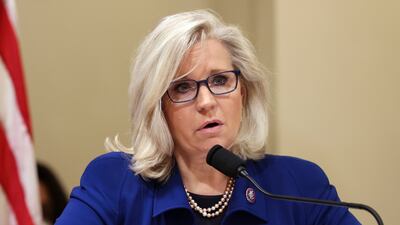The US House of Representatives passed a bill 316-113 on Thursday that would create an independent, bipartisan commission to examine the lessons learnt from two decades of war in Afghanistan.
The provision, introduced by Republican Liz Cheney, is part of the annual defence authorisation bill. It would authorise $5 million to create a 12-member commission equally divided between Republicans and Democrats who would need to deliver a final report by the end of next year.
“It requires an analysis, both of the tactical and strategic conduct of the war and of the lessons learnt,” Ms Cheney said upon introducing the provision this month.
“We have very different and strongly held views about the war, about what went right and what went wrong. But the nation deserves a transparent look at what happened and the lessons that we need to learn going forward.”
The final report requires an assessment of the intelligence and information that Joe Biden, Donald Trump, Barack Obama and George W Bush used to make their decisions on Afghanistan during their presidencies.
The commission would be charged with scrutinising Mr Bush’s initial invasion, Mr Obama’s troop surge and subsequent drawdown, Mr Trump’s negotiations with the Taliban and Mr Biden’s execution of the military withdrawal.
The commission would also examine the period of Taliban rule between 1996 and 2001.
It singles out Mr Obama’s reduction of troops in 2011 and Mr Biden’s full military withdrawal as items that the commission would need to address in its final report, which is due in August of next year. The commission would also have to provide an interim briefing to Congress by March.
Congress had previously commissioned an Afghanistan Study Group, which released a series of recommendations in February.
But Mr Biden ignored the study group's suggestions, which cautioned against a US withdrawal without placing enforceable conditions on the Taliban and a peace agreement between the group and Ashraf Ghani’s government.
Defence Secretary Lloyd Austin, Chairman of the Joint Chiefs of Staff Gen Mark Milley and US Central Command chief Gen Kenneth McKenzie are scheduled to testify on Afghanistan before the Senate next week.
The Senate has yet to vote on its version of the defence authorisation bill, but Ms Cheney’s provision to create an Afghanistan commission is likely to become law given the overwhelming bipartisan support it has received.
The House’s defence authorisation bill also includes a series of other reporting and briefing requirements on Afghanistan that the Biden administration would have to honour.
The House bill also contains several provisions related to Saudi Arabia.
One measure, introduced by Democrat Gerry Connolly, would bar the US from transferring military equipment to Saudi Arabia unless the president certifies the kingdom is not conducting the “forced repatriation, intimidation or killing of dissidents in other countries” or “the unjust imprisonment in Saudi Arabia of United States citizens.”
But the bill allows the president to issue a national security waiver on arms transfers to Riyadh and contains an exemption for equipment used in “the defence of the territory of Saudi Arabia from external threat".
Democrats Gregory Meeks, Ro Khanna and Alexandria Ocasio-Cortez also introduced other provisions to the bill concerning Saudi arms transfers.






